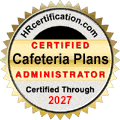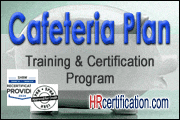Section 125 Cafeteria Plans Training And Certification
What Is A Section 125 Cafeteria Plan?
A Section 125 Cafeteria Plan, also known as a cafeteria plan or a flexible benefits plan, is a type of employee benefits plan governed by Section 125 of the Internal Revenue Code in the United States. It allows employees to choose from a menu of pre-tax benefits, similar to selecting items from a cafeteria menu.
Benefits Of A Cafeteria Plan
Under a Section 125 plan, eligible employees can use pre-tax dollars to pay for certain qualified expenses, such as health insurance premiums, dental and vision care, unreimbursed medical expenses, and dependent care expenses.
By reducing taxable income, employees:

- Lower federal income tax liability
- Reduce Social Security and Medicare taxes
- Increase take-home pay
Employers benefit by:
- Reducing payroll taxes
- Potentially lowering workers' compensation premiums
- Enhancing competitive benefits offerings
There are different types of Section 125 plans, including Premium Only Plans (POP), Flexible Spending Accounts (FSA), Health Savings Accounts (HSA), and Dependent Care Assistance Plans (DCAP), each with its own set of rules and regulations. These plans can offer significant tax advantages for both employers and employees, making them a popular component of many employee benefits packages.
Why Proper Section 125 Compliance Administration Is Critical
Section 125 plans are strictly regulated by the IRS. Failure to comply can result in:
- Loss of tax-qualified status
- Retroactive taxation of employee benefits
- Payroll tax penalties
- IRS audits
- Employer liability for non-discrimination violations
Administrative Requirements of a Section 125 Plan
Our
Cafeteria Plan Training & Certification Program is an online training course that provides in-depth guidance on all Cafeteria Plan administrative requirements, including:
Written Plan Documentation
Employers must maintain a compliant written plan document that includes:
- Eligibility rules
- Available benefits
- Contribution limits
- Election procedures
- Status change rules
- Claims and reimbursement procedures
Required documents typically include:
- Master Plan Document
- Summary Plan Description (SPD)
- Election Forms
- Status Change Forms
- Reimbursement Request Forms
Failure to maintain proper documentation can jeopardize plan qualification.
Plan Administration Procedures
Employers must establish clear procedures for:
- Enrollment
- Open enrollment periods
- Benefit elections
- Election changes
- Participant termination
- Coordination with third-party administrators (TPAs)
Even if administration is outsourced, the employer remains legally responsible.
Annual Enrollment Requirements
Section 125 elections are generally irrevocable for the plan year. Employers must:
- Conduct annual enrollment
- Communicate deadlines clearly
- Ensure proper election documentation
Qualified Status Changes
Mid-year election changes are permitted only for specific IRS-defined “status change†events, such as:
- Marriage or divorce
- Birth or adoption
- Change in employment status
- Dependent eligibility changes
Improperly allowing election changes outside these events can invalidate pre-tax status.
Non-Discrimination Testing
Section 125 plans must pass nondiscrimination testing to ensure benefits do not favor Highly Compensated Employees (HCEs) or Key Employees. Failure may result in:
- Taxable income for HCEs
- Loss of employer payroll tax savings
- Plan disqualification risk
Reporting & Disclosure Requirements
Depending on plan size and structure, employers may need to:
- Provide Summary Plan Descriptions (SPDs)
- File Form 5500 (if applicable)
- Maintain contribution and reimbursement records
- Disclose plan changes
Accurate recordkeeping is essential for audit defense.
About Our Section 125 Training & Certification Program
Participants in our Section 125 Training & Certification Program will gain practical expertise in:
- Eligible benefits and expenses

- Eligible participants
- Plan design options
- Governance requirements
- Election procedures
- Claims processing
- Reimbursement rules
- Status change documentation
- Non-discrimination testing methodology
- IRS reporting requirements
- Integration with other benefits laws
And in addition to the great training, individuals can earn a "
Certified Cafeteria Plan Administrator" designation and TPAs can earn a "
Certified Cafeteria Plan TPA" seal that can help increase your or your firm's value.
Recommended Section 125 Cafeteria Plan Training
Searching for cafeteria plan training? Need help understanding section 125 regulations, HSA rules, or the various complexities of cafeteria plan administration? How about administering health care or dependent care flexible spending accounts, the status change rules, and non-discrimination testing? Then you've come to the right place, as HRTrainingCenter.com offers valuable cafeteria plan and HSA training courses.
Best-Selling Training Courses:
Online Training Courses
Top FAQs
A Cafeteria Plan is an employer-sponsored benefit that complies with Section 125 of the Internal Revenue Code.
Cafeteria Plans allow employees to pay certain qualified medical expenses on a pre-tax basis.
Cafeteria Plans offer tax savings on certain health insurance premiums for medical, dental, and vision coverage, plus certain costs for health and dependent care
Yes. There are also notice and reporting requirements to have a qualified Cafeteria Plan.
Yes. Additionally, there are certain rules regarding what qualifies, status changes, use of funds, and more.
There are several: employees get beneficial tax treatment on certain expenses, while employers get to cost share health care premiums and save on reduced payroll tax expenses.
Find Seminars, Webinars, And Online Training In Your Area
The Administrative Requirements Of A Section 125 Cafeteria Plan
A Section 125 Cafeteria Plan is subject to various administrative requirements to maintain compliance with IRS regulations. Failure to meet or comply with the rules and regulations could result in not just fines and penalties to the organization, but having benefits for individual participants rescinded or reversed. These requirements include:
- Plan Document, Forms, And Communications:
Employers must establish a written plan document that outlines the terms and conditions of the plan. The document should include details such as eligibility criteria, benefits offered, contribution limits, procedures for enrollment, and any applicable changes. Some of the documents and forms for the 'in writing' requirements include the Master Plan Document, a Summary Plan Description (SPD), and Election, Change Of Status, and Reimbursement Forms.
- Plan Administration:
Employers must establish procedures for the administration of the Section 125 plan, including processes for enrollment, changes, and termination of participation. This may involve working with a third-party administrator to manage plan contributions, reimbursements, and compliance tasks. Employers must ensure that the Section 125 plan complies with all relevant IRS regulations, including rules regarding eligible benefits, contribution limits, and tax treatment. - Annual Enrollment:
Employers typically conduct annual enrollment periods during which employees can elect or change their benefits under the Section 125 plan. Employers must establish clear deadlines and procedures for employees to make these elections. - Status Changes:
Elections under a Cafeteria Plan are considered irrevocable unless the individual separates from service with the sponsoring employer or experiences an event known as a status change. There are certain requirements and restrictions on status changes, so employers need to make sure their applicable forms and processes comply properly. - Non-Discrimination Testing:
Section 125 plans must undergo non-discrimination testing to ensure that the plan does not favor highly-compensated employees (HCEs) over non-highly compensated employees (NHCEs). - Reporting And Disclosure:
Employers are required to provide certain reports and disclosures to employees and the IRS. This may include annual reports on plan activity, summary plan descriptions (SPDs), and annual Form 5500 filings for plans with 100 or more participants. - Recordkeeping:
Employers must maintain accurate records related to the Section 125 plan, including enrollment forms, election changes, contribution records, and compliance documents. These records should be retained for the duration of the plan year plus an additional period to satisfy IRS requirements. Although the filing of Form 5500 may be outsourced to a third-party such as an accountant, attorney, or TPA, the plan administrator is ultimately responsible for filing the form on a timely basis.
By adhering to these administrative requirements, employers can ensure the successful operation and compliance of their Section 125 Cafeteria Plans.
Common Mistakes When Administering A Section 125 Cafeteria Plan
Administering a Section 125 Cafeteria Plan can be complex, and there are several common mistakes that employers may make during the administration process. Here are some of the most frequent errors that you should be aware of, and that our Section 125 Cafeteria Plan training courses can help you prevent:
- Missing Or Incomplete Documentation:
Proper documentation is crucial for demonstrating compliance with Section 125 regulations. This includes maintaining records of employee elections, plan documents, and any changes made to the plan over time. - Failure to Provide Required Notices:
Employers are required to provide certain notices to employees regarding their rights and responsibilities under the cafeteria plan, such as the opportunity to enroll or make changes during open enrollment periods. Failure to provide these notices can result in compliance issues.
- Incorrect Handling Of Qualified Status Changes:
Section 125 allows employees to make changes to their benefit elections in the event of certain qualified life events, such as marriage, birth/adoption of a child, or a change in employment status. Employers must ensure that these changes are processed correctly and within the required timeframe. - Failure To Monitor Contribution Limits:
Section 125 imposes limits on certain contributions, such as contributions to flexible spending accounts (FSAs). Employers must monitor these limits to ensure that employees do not exceed them, which could result in adverse tax consequences. - Lack Of Compliance With Discrimination Testing:
Cafeteria plans must undergo nondiscrimination testing to ensure that benefits are not disproportionately favoring highly compensated employees. A plan that is found to be discriminatory will not be a qualified plan. AS such, highly compensated and/or key employees may be taxed on all benefits they could have elected under the plan, plus the employer loses payroll tax savings on benefits that are taxed. Additionally, failure to comply with these testing requirements can result in penalties and potential plan disqualification. - Failure To Communicate Plan Changes:
Employees need to be informed about any changes to the cafeteria plan, such as changes in coverage options, contribution limits, or eligibility requirements. Failure to communicate these changes can lead to confusion and dissatisfaction among employees. Administrative Tip: To provide for uniform plan administration and protect a plan-qualified status, employers should list the status changes allowed in their plans in their written Cafeteria Plan documents and in their Summary Plan Descriptions - Poor Recordkeeping:
Accurate recordkeeping is essential for administering a Section 125 plan. Employers must maintain records of employee elections, contributions, reimbursements, and other relevant information to demonstrate compliance with IRS regulations.
Frequently Asked Questions
Must an employer have a written Section 125 plan document? Yes. A written plan document is required to maintain tax-qualified status.
Are there limits on FSA or dependent care contributions? Yes. The IRS sets annual limits for various pre-tax benefit accounts.
What happens if a plan fails nondiscrimination testing? Highly compensated employees may lose tax advantages, and the employer may lose payroll tax savings.
Can employees change elections mid-year?Only if a qualifying status change occurs under IRS regulations.
Strengthen Your Benefits Compliance Strategy
Section 125 Cafeteria Plans provide powerful tax advantages — but only if administered correctly. Our Section 125 Cafeteria Plan Training ensures you:
- Maintain tax-qualified status
- Avoid IRS penalties
- Conduct proper nondiscrimination testing
- Implement defensible documentation processes
- Protect employer payroll tax savings
Enroll today and earn your Certified Cafeteria Plan Administrator designation.


 770-410-1219
770-410-1219










